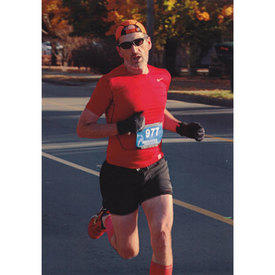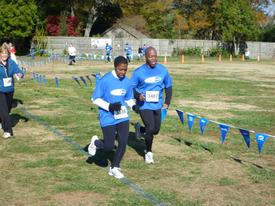WTF? Study: Too much jogging can lead to early death

Calliope610
Posts: 3,783 Member
Headline from the Houston Chronicle online: Study: Too much jogging can lead to early death
Running for better health? You may want to sit down for this.
A recent study published in HealthDay from the Cardiovascular Research Institute in Pennsylvania says both too much and too little jogging can lead to an earlier death compared with running a moderate amount.
"I certainly don't tell patients, 'Don't run,' " Dr. Martin Matsumura, co-director of the Cardiovascular Research Institute at the Lehigh Valley Health Network in Allentown, Pa., said in an interview with HealthDay.
Similar to Goldilocks, you can't run too much or too little. So it begs the question: What's the sweet spot? According to researchers, people should aim for two to three hours per week. The reasons for the study's findings remain unclear.
"What we still don't understand is defining the optimal dose of running for health and longevity," Matsumura added.
But Dr. James O'Keefe, who spoke to HealthDay, says it could simply be a case of "too much wear and tear" on the body.
"If you want to run a marathon," O'Keefe told HealthDay, "run one and cross it off your bucket list."
The researchers studied more than 3,800 runners. The participants were both men and women and had an average age of 46. Nearly 70 percent of the participants said they ran more than 20 miles a week.
I bolded my favorite part of the article.
Running for better health? You may want to sit down for this.
A recent study published in HealthDay from the Cardiovascular Research Institute in Pennsylvania says both too much and too little jogging can lead to an earlier death compared with running a moderate amount.
"I certainly don't tell patients, 'Don't run,' " Dr. Martin Matsumura, co-director of the Cardiovascular Research Institute at the Lehigh Valley Health Network in Allentown, Pa., said in an interview with HealthDay.
Similar to Goldilocks, you can't run too much or too little. So it begs the question: What's the sweet spot? According to researchers, people should aim for two to three hours per week. The reasons for the study's findings remain unclear.
"What we still don't understand is defining the optimal dose of running for health and longevity," Matsumura added.
But Dr. James O'Keefe, who spoke to HealthDay, says it could simply be a case of "too much wear and tear" on the body.
"If you want to run a marathon," O'Keefe told HealthDay, "run one and cross it off your bucket list."
The researchers studied more than 3,800 runners. The participants were both men and women and had an average age of 46. Nearly 70 percent of the participants said they ran more than 20 miles a week.
I bolded my favorite part of the article.
0
Replies
-
It's a total BS study that get's trotted out by the media about twice a year.
http://sciencebasedrunning.com/2013/05/omg-were-all-gonna-dieeleventy/
http://www.runnersworld.com/health/too-much-running-myth-rises-again
Money quote:
What this means is that they used statistical methods to effectively “equalize” everyone’s weight, blood pressure, cholesterol, and so on. But this is absurd when you think about it. Why do we think running is good for health? In part because it plays a role in reducing weight, blood pressure, cholesterol, and so on.... They’re effectively saying, “If we ignore the known health benefits of greater amounts of aerobic exercise, then greater amounts of aerobic exercise don’t have any health benefits.”
Thanks to DaveMunger for the links and quote.0 -
I thought Carson's answer in another thread to a similar topic was pretty much on point:
"and along came a bus"
nothing to see here...just keep running and being awesome.0 -
Here's an even more exhaustive look at the (lack of) evidence linking running with shortened lifespan, by Alex Hutchinson:
http://www.runnersworld.com/health/will-running-too-much-kill-you0 -
Headline from the Houston Chronicle online: Study: Too much jogging can lead to early death
Running for better health? You may want to sit down for this.
A recent study published in HealthDay from the Cardiovascular Research Institute in Pennsylvania says both too much and too little jogging can lead to an earlier death compared with running a moderate amount.
"I certainly don't tell patients, 'Don't run,' " Dr. Martin Matsumura, co-director of the Cardiovascular Research Institute at the Lehigh Valley Health Network in Allentown, Pa., said in an interview with HealthDay.
Similar to Goldilocks, you can't run too much or too little. So it begs the question: What's the sweet spot? According to researchers, people should aim for two to three hours per week. The reasons for the study's findings remain unclear.
"What we still don't understand is defining the optimal dose of running for health and longevity," Matsumura added.
But Dr. James O'Keefe, who spoke to HealthDay, says it could simply be a case of "too much wear and tear" on the body.
"If you want to run a marathon," O'Keefe told HealthDay, "run one and cross it off your bucket list."
The researchers studied more than 3,800 runners. The participants were both men and women and had an average age of 46. Nearly 70 percent of the participants said they ran more than 20 miles a week.
I bolded my favorite part of the article.
I don't think 3,800 runners is really an in-depth study when you look at the amount of people running.0 -
That was one of the worst reports on the study I've seen yet. :laugh:
The study found a correlation between higher miles and a shorter lifespan however correlation =/= causation. A doctor friend of mine explained it that even if there is something to it, the "shorter" lifespan was not signifcantly so compared to the moderate runners and still far better than the non exercisers.0 -
I doubt it is the jogging/running that actually hastens death. But there could be reasons why it would figure into the big picture. Cutting back on running, or stopping altogether, but still eating as you did when you were running could lead to weight gain. Wear and tear or injury could lead to pain later in life that in turn leads to a more sedetary lifestyle. Those are two that I would imagine are fairly common.
But, in those scenarios, it's not running that caused early death. It's more the lack of it.0 -
I don't think 3,800 runners is really an in-depth study when you look at the amount of people running.
3,800 is plenty of runners for this kind of study, but it does become tricky when you are trying to analyze death statistics. You have to wait for people to die, and that can take a long time
The real problem was they were factoring out all the health benefits of running, then saying "if you factor out all the health benefits, running more doesn't make you live longer."0 -
I don't think 3,800 runners is really an in-depth study when you look at the amount of people running.
3,800 is plenty of runners for this kind of study, but it does become tricky when you are trying to analyze death statistics. You have to wait for people to die, and that can take a long time
The real problem was they were factoring out all the health benefits of running, then saying "if you factor out all the health benefits, running more doesn't make you live longer."
Where did you read that they factored out all the health benefits?0 -
so basically they did a study and found no information of any use?0
-
No. Just no.0
-
The research is pretty flawed this article actually explains it well
http://www.runnersworld.com/health/will-running-too-much-kill-you0 -
I have heard about running damaging joints in the long term. So wear and tear being more aggressive than those who don't exercise so vigorously could suggest not living so long?
But there are sooooooo many other factors and the fact death is inevitable its just a pointless argument.0 -
that's why it comes so highly recommended when people want to lose weight, right?0
-
Didn't 2 runners just die this week at the finish line of a half marathon0
-
Didn't 2 runners just die this week at the finish line of a half marathon
Probably because of a pre-existing heart condition:
http://www.forbes.com/sites/davidkroll/2014/04/15/why-do-healthy-people-die-running-marathons/0 -
I have heard about running damaging joints in the long term.
Another fable disproved by actual science.0 -
i guess if you jogged thru an intersection without waiting for your turn maybe?0
-
Running/jogging more exposes you to cars more. The more you are exposed to cars on foot, the higher your chances are of getting hit. If you get hit by a car, you might die...
Don't run. You will die young0 -
The point is not to go into your grave "perfectly intact" with little to no wear on your body.
That sounds boring as hell.
I'd rather go into the next life having worn this body out entirely and knowing I lived every moment and experienced life without fear.
Just my two cents.0 -
I always seem to find contradicting studies and I find it rather interesting. I remember reading that getting 8 hours or more of sleep is bad for you because it stresses out your heart. I read another study the same day saying that getting under 8 hours is bad for you because of the toll it takes on your body.
I think the key here is that studies MAY or CAN show. Take that "may" or "can" out and you actually have some real facts. Usually...0 -
Didn't 2 runners just die this week at the finish line of a half marathon
Probably because of a pre-existing heart condition:
http://www.forbes.com/sites/davidkroll/2014/04/15/why-do-healthy-people-die-running-marathons/
so had they not been running they might not have died as fast and had more time to find out they had a pre-existing heart condition?0 -
If you believe all the studies, you need to wear a mask to breathe air and probably boil the water 20 times and forget about eating. There is a this is bad study for almost everything you eat.0
-
Running/jogging more exposes you to cars more. The more you are exposed to cars on foot, the higher your chances are of getting hit. If you get hit by a car, you might die...
Don't run. You will die young
I know right? Don't forget lightning, rabid dogs, and meteors.0 -
I always seem to find contradicting studies and I find it rather interesting. I remember reading that getting 8 hours or more of sleep is bad for you because it stresses out your heart. I read another study the same day saying that getting under 8 hours is bad for you because of the toll it takes on your body.
I think the key here is that studies MAY or CAN show. Take that "may" or "can" out and you actually have some real facts. Usually...
Contradicting studies are normal in many fields of science. And studies rarely prove something. Studies suggest things and scientists form theories from them. Enough studies suggesting the same thing can drive recommendations.
This study hasn't been peer reviewed or published yet, so is considered preliminary.0 -
"Too much [insert any verb in the dictionary] can lead to early death.0
-
Didn't 2 runners just die this week at the finish line of a half marathon
Probably because of a pre-existing heart condition:
http://www.forbes.com/sites/davidkroll/2014/04/15/why-do-healthy-people-die-running-marathons/
so had they not been running they might not have died as fast and had more time to find out they had a pre-existing heart condition?
no, they would have just died the next time they had the sex.0 -
"Too much [insert any verb in the dictionary] can lead to early death.
This is exactly what I thought when I first read the article.0 -
Phew this was just the excuse I needed to sit on the couch tonight and do nothing. Thanks! :yawn:
People who believe this kind of nonsense make my head hurt.0 -
The only way I see jogging leading to an early death would be that the car that just missed me on the highway the other day had better aim.0
-
Didn't 2 runners just die this week at the finish line of a half marathon
Probably because of a pre-existing heart condition:
http://www.forbes.com/sites/davidkroll/2014/04/15/why-do-healthy-people-die-running-marathons/
so had they not been running they might not have died as fast and had more time to find out they had a pre-existing heart condition?
As the article points out, it's a real dilemma. There are some people who are literally ticking time bombs. We could pre-screen to see who is likely to die following an extended cardio session, but that would be expensive and might lead to false positives. Interestingly, this problem seems to mostly affect people under 40.0
This discussion has been closed.
Categories
- All Categories
- 1.4M Health, Wellness and Goals
- 395.9K Introduce Yourself
- 44.1K Getting Started
- 260.7K Health and Weight Loss
- 176.3K Food and Nutrition
- 47.6K Recipes
- 232.8K Fitness and Exercise
- 448 Sleep, Mindfulness and Overall Wellness
- 6.5K Goal: Maintaining Weight
- 8.6K Goal: Gaining Weight and Body Building
- 153.3K Motivation and Support
- 8.2K Challenges
- 1.3K Debate Club
- 96.4K Chit-Chat
- 2.5K Fun and Games
- 4.3K MyFitnessPal Information
- 16 News and Announcements
- 18 MyFitnessPal Academy
- 1.4K Feature Suggestions and Ideas
- 3K MyFitnessPal Tech Support Questions




















